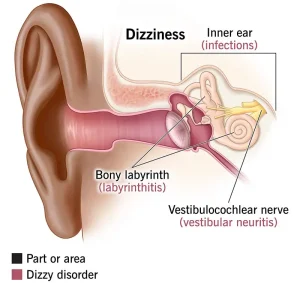Overview
Diagnosis
Diagnosis for dizziness or vertigo involves several steps your healthcare professional takes to identify the underlying cause. Imaging tests such as an MRI or CT scan may be ordered immediately if there’s a concern about a stroke, especially in older adults or those who’ve had a head injury.
Your healthcare professional will ask about your symptoms and medications, followed by a physical examination. During the exam, your balance, walking pattern, and the function of your major nerves will be checked.
You may also undergo hearing and balance tests, including:
-
Eye movement testing: The provider observes your eye movements while you track a moving object or while water or air is placed in your ear canal to test eye motion.
-
Head movement testing: Known as the Dix-Hallpike maneuver, this test helps confirm benign paroxysmal positional vertigo (BPPV).
-
Posturography: You stand barefoot on a platform to evaluate which parts of your balance system are functioning properly.
-
Rotary chair testing: You sit in a motorized chair that moves slowly in circles or small arcs to assess balance responses.
Additional tests such as blood tests may be ordered to check for infections or to evaluate heart and blood vessel health.
More Information
-
MRI
-
Neurological examinations
Treatment
In most cases, dizziness improves without treatment as the body naturally adapts within a few weeks. When treatment is needed, it depends on the cause and symptoms. Options may include medications, balance exercises, or therapy. Even when no specific cause is identified, treatment can often relieve symptoms.
Medications
-
Water pills: Diuretics may help reduce fluid buildup and dizziness in people with Meniere’s disease, especially when combined with a low-salt diet.
-
Medicines for dizziness and nausea: Prescription antihistamines and anticholinergics may provide quick relief but can cause drowsiness.
-
Anti-anxiety medications: Benzodiazepines such as diazepam (Valium) or alprazolam (Xanax) may help but carry a risk of dependency and drowsiness.
-
Migraine prevention medicines: Certain drugs can help reduce or prevent dizziness related to migraines.
Therapy
-
Head position movements: The canalith repositioning procedure, also known as the Epley maneuver, helps reposition inner ear crystals and is effective for treating BPPV. It’s often successful after one or two sessions.
-
Balance therapy: Vestibular rehabilitation includes exercises that improve stability and reduce motion sensitivity, especially for dizziness caused by inner ear problems like vestibular neuritis.
-
Talk therapy: Psychotherapy can help manage dizziness linked to anxiety or psychological stress.
Surgery or other procedures
-
Injections: Gentamicin injections into the inner ear can disable the affected ear’s balance function, allowing the other ear to compensate.
-
Labyrinthectomy: In rare cases where hearing is already severely impaired, the inner ear’s balance organ may be surgically removed. This permanently eliminates vertigo in that ear, while the other ear assumes balance control.
Advertisement

